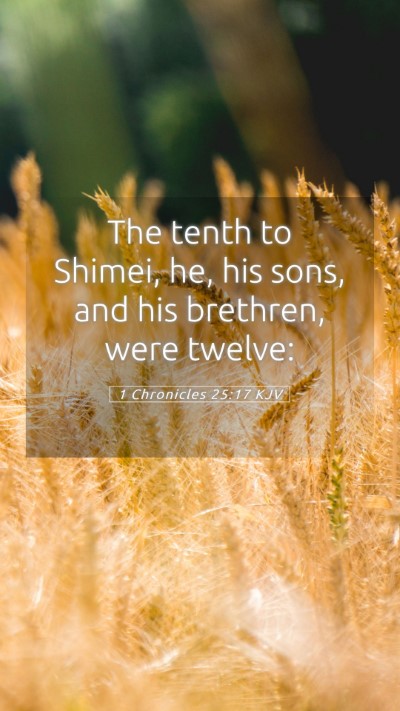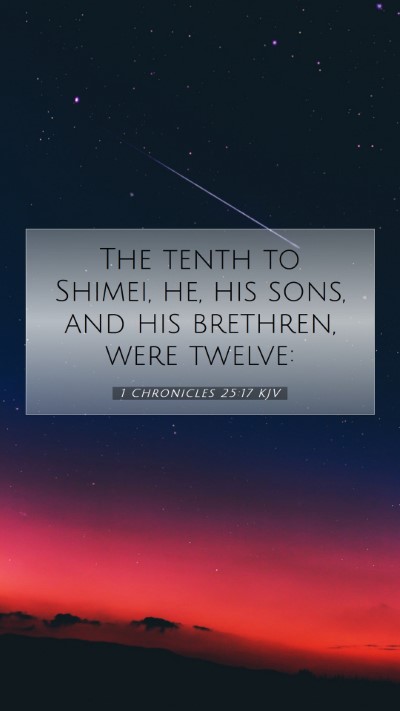Bible Verse Interpretation: 1 Chronicles 25:17
Verse: "The thirteenth to Shubael, he, his sons, and his brethren, were twelve."
In the context of 1 Chronicles 25:17, this verse details the organization of the musicians in the temple service assigned according to their lineage. This systematic approach to worship emphasizes several key aspects regarding the structure of the community and their responsibilities within the temple.
Understanding the Organizational Structure
The division of the musicians into specific groups illustrates God's desire for orderliness in worship. In this vein, commentators like Matthew Henry describe the roles of these individuals as serving not only a practical function but also as part of a divine plan to enhance worship practices.
-
Matthew Henry notes that specific assignments elevated the significance of the musicians’ roles in facilitating worship.
-
Albert Barnes emphasizes that this system of organization assured that no one person was solely responsible, promoting a cooperative atmosphere.
-
Adam Clarke explains the importance of acknowledging lineage in these roles, as it reinforced the sanctity of their service based on familial connections to worship.
Theological Significance
The verse serves to underscore the beauty of collaborative worship. In the context of biblical exegesis, we can observe how 1 Chronicles 25:17 relates to the overarching principle that worship is a community endeavor, reflecting not just individual piety but collective engagement.
Insights from Commentators
The depth of this verse is further enriched when considering various commentaries. The insights can be summarized as follows:
-
Henry’s Commentary: Leaders set an example, guiding the community in structured worship.
-
Barnes' Notes: Each group of musicians represents a facet of praise, all contributing to a singular purpose.
-
Clarke’s Exposition: The mention of brethren signifies unity among worshippers in achieving a common goal.
Implementing Worship Practices Today
The implications of the organization seen in 1 Chronicles 25:17 extend into modern worship settings. Here are a few Bible study insights derived from the verse:
-
Encourage collaboration in worship groups, reflecting on how diverse talents can enhance experiences.
-
Establish roles within church music ministries that mirror the structured approach seen in the biblical text.
-
Foster a sense of unity among members by recognizing contributions, thus embodying the spirit of cooperation found in Scripture.
Cross References
In relation to this verse, the following cross-references provide additional context and depth to the understanding of worship in the Old Testament:
- 1 Samuel 16:23: Describes David's use of music to soothe King Saul.
- 2 Chronicles 5:12-13: Discusses the dedication of the temple with music and praise.
- Psalm 150: A psalm highlighting the importance of music in glorifying God.
Conclusion
1 Chronicles 25:17 provides not just a historical account of temple musicians but lessons on the nature of worship itself. This verse encourages us to reflect on how we might implement biblical principles of collaboration and dedication in our worship practices. Understanding Bible verse meanings such as this one can greatly enhance our Bible study lessons and personal Bible study tools, enriching both individual and communal worship experiences.


